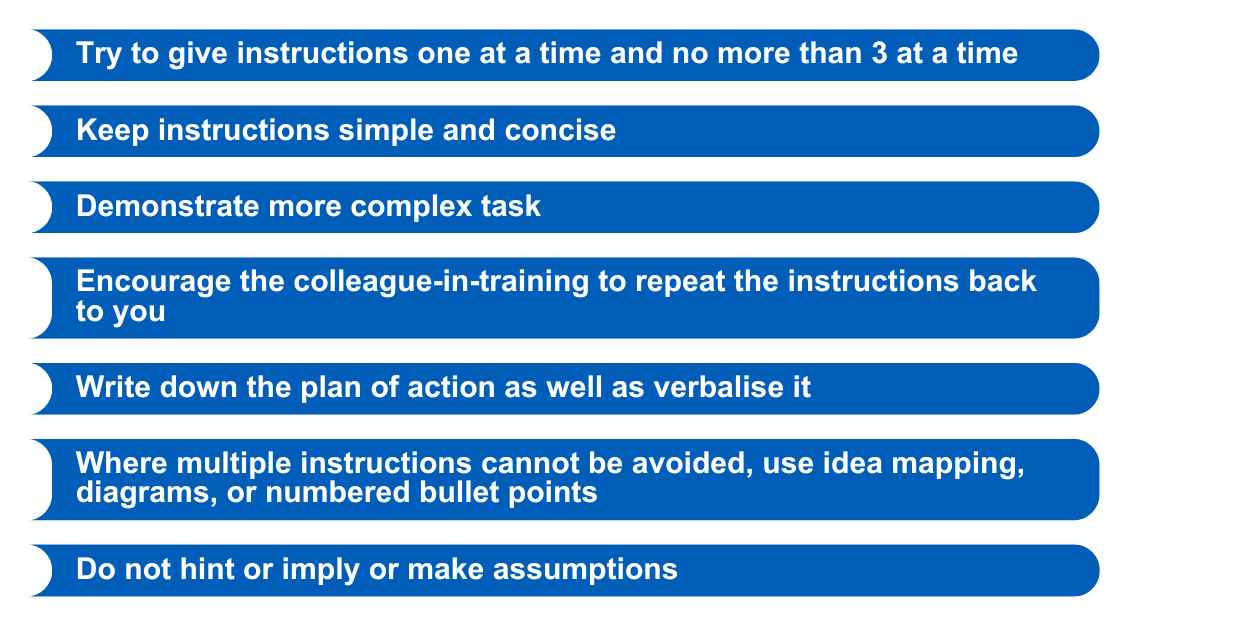How to support Neurodiversity in the workplace

Play to colleagues-in-training strengths for a better overall outcome for everyone.
It’s always easier to get the best out of colleagues-in-training when you focus on what they can do rather than what they can’t.
By raising awareness of neurodiversity, colleagues-in-training can take steps to make sure your workplace does not make life more difficult for people who process things differently. While not every neurodiverse individual will identify as having a disability, there will be those that do.
Five steps for making the workplace more accessible

Some neurodivergent colleagues-in-training may have difficulty communicating with others. For example, someone with autism might:


Try to think about the type of work, tasks, and routines that will work best for colleagues-in-training. For example, some people with ADHD struggle with repetitive work. They might work best in a diverse role, where they can take regular breaks and work flexible hours. Or if someone has dyslexia, consider giving them more time to read and finish tasks.
You could also record your meetings so that they don’t have to take notes. As with all team members, make sure to monitor workload to stop anyone feeling overloaded, stressed, or under pressure at work.


Consider the physical environment traditional workspaces are often designed with the needs of a neurotypical society in mind. But some working conditions can form a barrier to neurodivergent colleagues-in-training. Bright lighting, lots of noise, and interruptions in a busy department may feel overstimulating or overwhelming for some neurodivergent colleagues-in-training. The journey into work may cause them anxiety, and the lack of personal or quiet space could also be difficult to manage. You may wish to consider some of the below:

It might also help to have specific quiet zones in the department that are available for all colleagues-in-training to use when they need. This can help to create a supportive space while preventing a neurodivergent colleague-in-training from feeling singled out. Transitioning to a new placement can also be overwhelming and cause a great deal of anxiety and can be difficult and stressful for colleagues-in-training to talk about their condition.

Try to use direct language and say exactly what you mean. Ask specific questions, structure your instructions, avoid using jargon, and allow enough time to process what you’re saying. It might also help to provide communications materials in a range of formats.
Inclusive language: words to use and avoid when writing about disability - GOV.UK (www.gov.uk)

It’s important to be understanding and approachable so that colleagues-in-training feel they can ask for help if they need it. It will help them feel supported, but don’t put any pressure on them to open up if they don’t want to. Make sure you check in regularly to see how they’re doing and whether you need to make any adjustments to their working practices. A colleague-in-training might have a better idea of what could help, and they’ll also know if their needs have changed. If your colleague-in-training is struggling at work, try to remain patient and empathetic towards their feelings, as you would with any other employee.
Ensure the rest of your team have an awareness and understanding of neurodiversity to avoid any discrimination.
Diagnosis
Seeking a diagnosis is an colleague-in-training's choice. There are some things you should consider before you do so;

Professional Support Wellbeing (PSW)
Check your region's NHS England professional support wellbeing contact page for further guidance and advice on how to be referred into the PSW. The support offered via the PSW regarding the assessment will only highlight characteristics consistent with ADHD, Dyslexia etc. along with suggesting reasonable adjustments whilst undertaking your speciality training.
The assessment report will not be a formal clinical diagnosis, any formal clinical diagnosis, and any potential medical treatment, you would need to seek a medical referral via your GP.
Dyslexia screening
Do you feel you have traits of dyslexia and would like to take a short test to highlight a potential diagnosis? We've created a short check which you can do that includes a number of questions that ask you regarding how comfortable you are with reading and writing, as well as other areas.
Please note that the quiz is just to see if you have any traits of dyslexia - it does not officially diagnose dyslexia.
If you feel comfortable to take the short quiz, please complete this document and return to lead.employer@merseywestlancs.nhs.uk.
ADHD welfare pack
ADHD UK have created a welfare pack to help people with ADHD in the workplace. Please see link below for more information;
ADHD and Work | Welfare Pack to help ADHD in the workplace (adhduk.co.uk)
